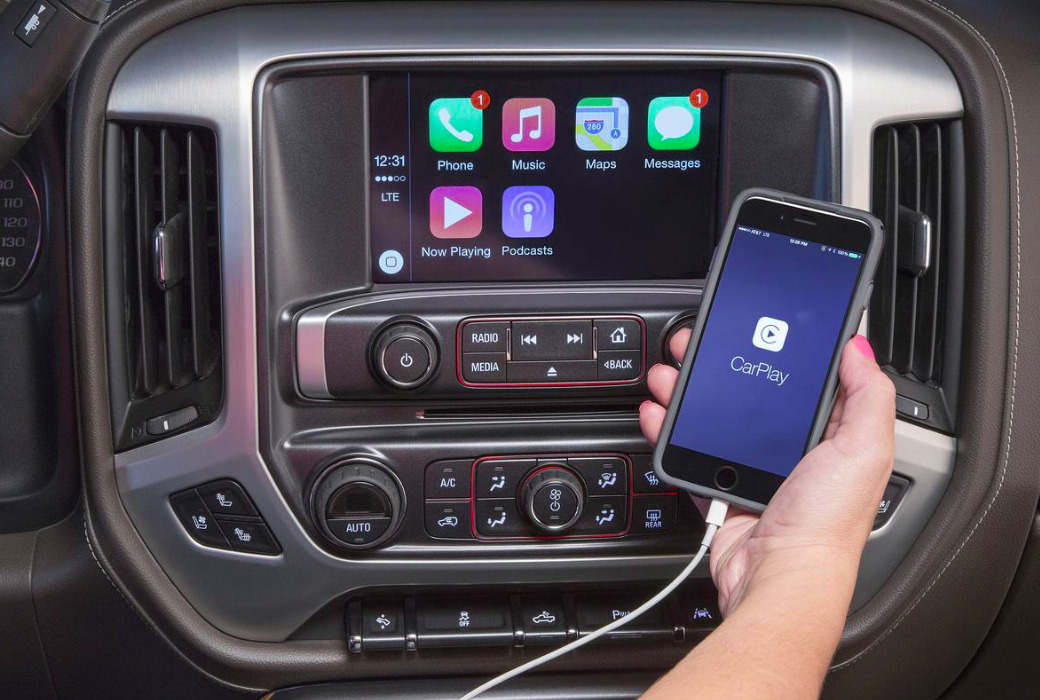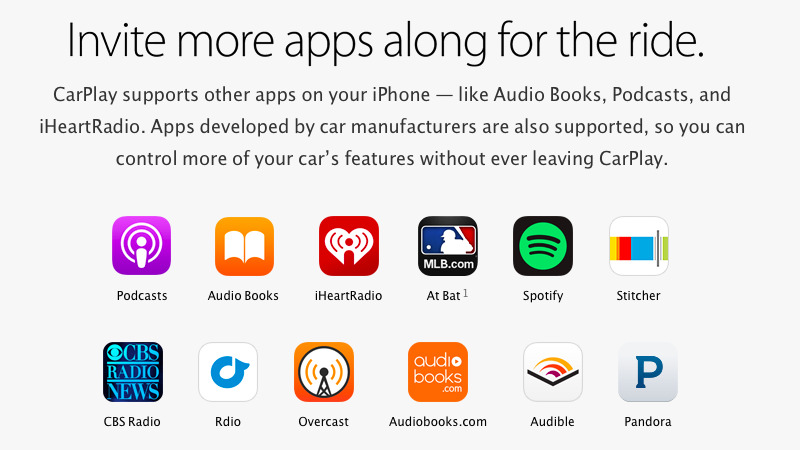American automaker General Motors has rolled out support for Apple's CarPlay iPhone integration faster and across more models than its rivals, resulting in independent dealers reporting that the feature draws in customers and helps to close the deal in selling new cars.
Source: Wall Street Journal crediting VANDERKAAY/GMC
Apple announced its "iOS in the Car" strategy at its Worldwide Developer Conference in 2013, and subsequently launched CarPlay last March. The feature enables users to connect an iPhone while driving and get directions, make calls, send and receive messages and listen to music using voice and the built in display and controls of supported vehicles.
While Apple has reported that all major car makers have now partnered with it in plans to support integration of CarPlay, most carmakers so far have only added support to a few models, and some— including Toyota, the world's largest in unit production— appear to still be taking a wait-and-see approach.
In contrast, General Motors has— after a late start— aggressively moved to add CarPlay to 14 of its 2016 Chevrolet models and the "majority" of its Cadillac vehicles. According to a report by Mike Ramsey for the Wall Street Journal, GM now offers 27 models with CarPlay, "far more than any other auto company."
Dealers report CarPlay is selling GM's vehicles
The report noted GM as saying CarPlay as a feature "has been well received," citing executive Phil Abram as noting that customers have been 'asking for the feature for years' and that GM plans to expand it to many more models as soon as possible.
Chris Hemmersmeier, the chief executive of Jerry Seiner Dealerships in Salt Lake City, Utah, told the Journal, "We've had people coming in because they've heard about it, and once they see it, they really do like it because it mirrors the look and feel of the devices they use. It's helping to close the deal once they see it."
A major part of the attraction is that CarPlay offers Apple Maps in-vehicle navigation that is more familiar to users, much cheaper than automaker's own navigation systems (which typically start at around $900), and in most cases superior, in addition to being regularly updated by Apple.
Gavin McGrath, a general manager of the Pat McGrath Chevyland dealership in Cedar Rapids, Iowa, said his dealership has been advertising CarPlay availability and noted specifically that it has attracted customers.
"It certainly has helped us," McGrath told the Journal. "The biggest thing that it has brought to the retail front is [...] navigation is going to cost [as an option] $900, $1,000. Here you have Apple CarPlay [which GM offers as a no-cost option on vehicles with a built-in display], and boom your nav is there. That has already helped us close deals."
Readers agree: CarPlay works well
Commenting on the article, reader Richard Blau stated that as an early adopter of CarPlay in his GM Yukon, "you have to give GM credit for their electronics. Much better than their natural competition. Much better than BMW or Porsche. Ridiculous as it sounds, the stereo in my Yukon sounds better than those in other, far more expensive vehicles. All should adopt CarPlay."
Another reader, Brad Crystal, stated that, "having used CarPlay in a rented 2016 Chevrolet Impala last month, I can attest that it works superbly. Easily the best user interface of any in-dash infotainment system I've ever experienced in a car. "Having used CarPlay in a rented 2016 Chevrolet Impala last month, I can attest that it works superbly" - reader Brad Crystal
"Positively blows away the iDrive system in my BMW M4," he added. "Texting is a particularly cool feature in that it's entirely voice activated, and the voice recognition is dead-on accurate. It's as easy to send/receive texts as it is to make phone calls— with none of the obvious dangers associated with texting & driving."
Reader George Andrews added, "Anyone who has NAV in their vehicle knows that you have the initial cost, then they charge you over and over with the updates. Ahhhh... Cash outflow gone. Apple rules!"
In addition to updating Maps and CarPlay features as part of iOS upgrades on the user's phone, Apple also supports CarPlay feature extensions via third party apps including audiobooks and podcasts; music, sports and news radio stations; and carmaker's own apps providing access to vehicle information.
Reports from car makers, dealers, vehicle buyers and renters all fly in the face of survey research generated by J.D. Power, which recently claimed that 37 percent of respondents did not want CarPlay in their car, despite the fact that 84 percent said they wanted a "phone pairing system," listing the feature among the top five most desired automotive technology features.
Apple's rapid moves in automotive
While Apple's rollout of CarPlay has appeared to be slow, particularly in contrast to the aggressive implementation schedule it laid out from the beginning, its uptake by car makers has actually been surprisingly quick given the time it has historically taken for automakers to adopt entirely new technologies and features.
In particular, the early results of CarPlay are a strong endorsement of Apple's Maps strategy, which bypassed Google's ad-based but mature mapping product in favor of an in-house system without ads, paired with a upfront privacy policy that explicitly does not track users' location or spy on their behaviors to sell more targeted advertising.
While ridiculed by Apple detractors as being inferior to Google Maps, particularly in the areas of merchant points of presence, transit directions, and general map data in rural and remote areas, Apple's own Maps have incrementally improved over the last three years. Even from the start, however, Apple's Maps were frequently superior to car navigation systems, including a high-end new 2011 BMW system AppleInsider compared it to immediately after it first launched as part of iOS 6.
On iOS devices, users now access Apple's Maps three times as often as Google Maps. That trend will be difficult for Google to reverse, particularly given that Apple continues to gain switchers upgrading from Android to higher-end iPhones.
In the context of phone integration and maps navigation for vehicles, the Journal article only made a passing reference to "competing software for Alphabet Inc.'s Android operating system," without even even mentioning the name of Google's own CarPlay alternative. Google's clone of CarPlay is similar enough to often work in vehicles that support CarPlay, although it does require Android 5 Lollipop or later, which Google currently reports only 30 percent of active Play users have installed.
Last year, Ford announced plans to ditch its partnership with Microsoft Sync in favor of a Blackberry-owned QNX hardware system capable of supporting CarPlay, in an effort to offer users a system "more responsive and less clumsy to use."
However, Ford will be supporting a firmware update for second-generation Sync vehicles dating back to 2011 that will allow them to support Apple's Siri-based Eyes Free system. It expects to add full CarPlay support in upcoming vehicles as part of its new third generation platform, but has not yet released a launch date.
 Daniel Eran Dilger
Daniel Eran Dilger





-xl-m.jpg)


-m.jpg)






 Thomas Sibilly
Thomas Sibilly
 Wesley Hilliard
Wesley Hilliard
 Christine McKee
Christine McKee
 Amber Neely
Amber Neely
 William Gallagher
William Gallagher
 Malcolm Owen
Malcolm Owen

 Mike Wuerthele
Mike Wuerthele







37 Comments
Meanwhile, Hyundai is selling cars with the promise of CarPlay. I've been waiting since October....of last year.
Pity that Apple CarPlay in my Chevy Volt is so unreliable. Crashes frequently.
I've been thinking, Carplay+AppleCar can really take over the entire auto industry. Carplay in most non Apple vehicles and Apple vehicles on the road. Great move.
(Fix Maps to seal the deal)
From what I've seen, CarPlay may share some typography and iconography with iOS devices, but the physical interaction is definitely not Apple. Those expecting iPad levels of responsiveness and smoothness and feel will be disappointed in CarPlay. I find it to be laggy and jerky.